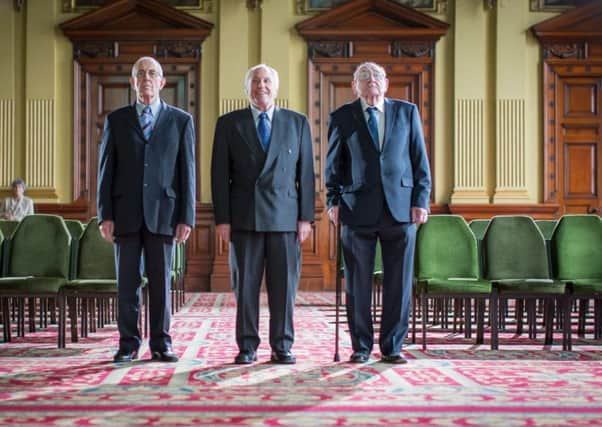Holyrood honour for Scots workers who grounded General Pinochet's fighter jets


The men who worked in the Rolls-Royce factory in East Kilbride, South Lanarkshire, starred in the award-winning documentary “Nae Pasaran!” which received its world premiere at the Glasgow Film Festival in March.
They will be joined by Edinburgh-based film maker Felipe Bustos Sierra whose father was a Chilean journalist in exile and who tracked down the former workers after hearing fellow Chileans talk about the men.
Advertisement
Hide AdAdvertisement
Hide AdA motion raised by Linda Fabiani, SNP MSP for East Kilbride, has cross-party supporting allowing a debate tomorrow will commend the men’s action.
It states the parliament “Commends the director and filmmaker, Felipe Bustos Sierra, and his production team, on their relentless commitment in bringing to light the story of Rolls-Royce engineers in East Kilbride who, in 1974, showed their support for the people of Chile by refusing to repair jet engines for the Chilean air force; recognises the determination of the film’s main characters, the engineers Bob Fulton, Robert Somerville, John Keenan and Stuart Barrie, and all of the others who took part in the boycott, to stand against fascism in defence of the democratic rights of the Chilean people, and considers the film to be a depiction of a remarkable piece of Scotland’s industrial history, which illustrates an admirable act of solidarity between Scottish workers and the Chilean people.”
The film will have special previews in cinemas across the UK this month including Edinburgh, Glasgow, Dundee and Aberdeen to coincide with the 45th anniversary of the coup, before going on general release on 2 November.
Mr Barrie, 74, from East Kilbride, one of the shop stewards involved in staging the boycott, said: “It’s great there is the recognition of the action taken back then. Direct action like ours can get negative publicity but it was a matter of principle. We had the strength of the union behind us and that’s want gave us the freedom and confidence to stand up to Pinochet.”
Describing how the decision was made in March 1974, Mr Barrie said: “I was approached by another AEUW shop steward, Bob Fulton, who said ‘Stuart, there’s Chilean engines in here’. Our union had condemned the Chilean junta’s overthrow of the government and the torturing and killing of civilians and those who opposed it. So I said to Bob, ‘right, let’s black the f******’. Bob also said he was a Christian and didn’t want to work on them. I was 29 then, a bit of firebrand, I did things like that if I thought it was correct. We were all a wee bit proud of the way it worked out.
“Years later we heard that folk in Chile were inspired by us. We’ve met a guy who was in prison being tortured and he said he heard about our action on the radio his guard had. He said it gave him the will to live. It was a wee spark of life, it lifted him up.”
Mr Barrie added he and his colleagues were later listed on the economic league “blacklist”, creating difficulties in getting employment with other employers in the future.
Mr Bustos Sierra said it was a “lovely surprise” to be invited to the Scottish Parliament.
“It was a moral decision by the workers and one which showed their tremendous resilience.”